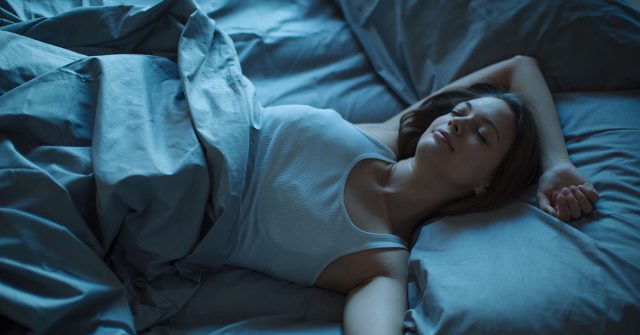A good night’s sleep is equally as important for our overall health as is exercise and a healthy diet. It helps us stay calm, motivated and focused throughout the day, and helps to keep our minds and bodies healthy. Having a good night’s sleep reduces stress and anxiety. Without enough sleep, our bodies and minds become easily exhausted, agitated and stressed.
Sleep helps regulate our hormones and brain function, and plays a critical role in keeping us healthy. Yet millions of people suffer from sleep deprivation and a poor quality of sleep. Good sleep can help us lose weight, exercise better and help to optimize our immune systems, so it’s really important to make sure we’re sleeping well and enough.
Here Are 12 Natural Ways To Sleep Better At Night According To Studies And Science
1. Don’t Consume Caffeine Late in the Day
Did you know that the stimulating effects of caffeine can stay in the blood for 6 to 8 hours? Drinking large amounts of coffee after 3 or 4 p.m. is not recommended — especially if you are sensitive to caffeine or have trouble sleeping. Studies have shown that consuming caffeine up to 6 hours before going to sleep can have significant effects on sleep disturbance.
2. Avoid Long Daytime Naps
While short power naps are beneficial, long naps during the day can throw off the body’s internal clock, making it difficult to fall asleep at a healthy time. One study found that napping for 30 minutes or less can enhance daytime brain function, but longer naps can negatively affect health and sleep quality. It’s definitely okay to nap, but take care of your natural circadian rhythm by keeping them relatively short and avoiding very long daytime slumbers.
3. Increase Your Exposure To Bright Light During Daytime.
We all have a natural time-keeping clock known as circadian rhythm. It naturally tells your brain, body and hormones when to be awake(daytime) and when to sleep(nighttime) based on the intake of sunlight. During the daytime it is important for the body to get plenty of light exposure.
In one interesting study of people with insomnia, daytime bright light exposure improved sleep quality and duration. It also reduced the time it took to fall asleep by 83%. The results stated that, “Exposure to bright light resulted in substantial changes in sleep quality. Waking time within sleep was reduced by an hour, and sleep efficiency improved from 77.5% to 90%, without altering time spent in bed. Increased sleep time was in the form of Stage 2 sleep, REM sleep, and slow wave sleep. The effects were remarkably consistent across subjects.”
A similar study in older adults found that two hours of bright light exposure during the day increased the amount of sleep by two hours and sleep efficiency by 80%. They reported that, “Sleep improved substantially with bright light exposure. Waking time within nocturnal sleep was reduced by nearly two hours, and sleep efficiency improved from 73% to 86%.”
4. Reduce Blue Light Exposure In The Evening
Exposure to light during the day is beneficial, but nighttime light exposure has the opposite effect on our sleeping schedules. This is due to its impact on the body’s circadian rhythm, as the light tells the brain that it is still daytime when it is in fact night, keeping us awake for longer. This reduces hormones like melatonin, which help the body relax and cause deep sleep.
Blue light — which comes in large amounts from electronic devices like smartphones and computers, is the strongest in messing with the body’s circadian rhythm. Research suggests that we turn off the tv, laptop, smartphone and any bright lights two hours before heading to bed.
5. Get Daily Exercise
Exercise is one of the best science-backed ways to improve your sleep and health. We fall asleep faster and sleep sounder when we are physically exerting ourselves during the daytime hours. Although daily exercise is excellent for a good night’s sleep, exercising too late in the day may be detrimental due to its stimulatory effect, so be mindful to not exercising too soon before bed.
One study of older adults discovered that exercise nearly halves the amount of time it takes to fall asleep and provides roughly 41 more minutes of sleep at night on average.
In a study of participants with severe insomnia, exercise was more beneficial than the majority of prescription drugs. Exercise reduced the time it took those with insomnia to fall asleep by 55%! Total night wakefulness was reduced by 30%, anxiety levels by 15% and total sleep time was increased by a wonderful 18%.
6. Have Consistent Sleep and Wake Times.
Being consistent with your bed-time waking-time has a positive affect on long-term sleep quality and on the brain, one study found. The natural circadian system tends to have a loop of waking at sunrise, sleeping at sunset, and while we can adjust our sleeping schedules, optimal health comes from having regular and consistent times each day.
7. Don’t Drink Alcohol
Drinking before sleep can negatively affect sleep quality and the body’s hormones. Alcohol has been proven to increase the symptoms of sleep apnea, snoring, and overall disrupted sleeping patterns. Alcohol negatively affects the important sleep hormones melatonin and HGH which help to regulate the body’s natural circadian rhythm. If you have trouble sleeping and regularly consume alcohol, make sure to limit alcohol consumption for best results.
8. Optimize Your Bedroom Environment
Your bedroom should be your shrine to sleeping, free from lights and loud noise. When looking at things to enhance your sleep quality, you will want to consider: external lights, noise, temperature, and furniture arrangement. Having a comfortable mattress is also important in getting a good night’s sleep.
Studies have shown that external noise, usually from road traffic, can lead to poor quality of sleep and resulting health issues. On the other side of the coin, research has shown that reducing noise and light improves sleep quality.
9. Relax And Clear Your Mind In The Evening
Using relaxation techniques before sleep have been shown to improve one’s sleep quality, and are a popular form of treatment for those suffering from insomnia. You might try listening to calming music, light Yoga, taking a hot bath or shower, meditating, deep breathing, reading, all of which help to clear the mind of the days’ stressors. Multiple studies have shown the improvement of sleep quality and length after practicing relaxation techniques before bed.
10. Take a Relaxing Bath or Shower
Studies have shown that relaxing in hot water can improve overall sleep quality and help people — especially older adults — fall asleep faster. One study found that having a hot bath 90 minutes before bed improved sleep quality and helped people get deeper sleep. Research has shown that even simply putting your feet in hot water can help us relax and improve levels of sleep
11. Take a Melatonin Supplement
Melatonin is the brain’s sleep hormone that tells the body when it’s time to relax and head to bed. Often used to treat extreme cases of insomnia, melatonin supplements can improve sleep and energy levels.
In one study, half of the participants taking a melatonin supplement fell asleep faster and reported a 15% improvement in sleep quality. Always seek the professional advice of your doctor before trying a melatonin supplement.
12. Rule Out a Sleep Disorder
If you’ve tried all of the above and you still can’t fall asleep or stay asleep, an underlying health condition may be the cause. One common issue is sleep apnea, which causes inconsistent and interrupted breathing. People with this disorder stop breathing repeatedly during the night, causing sleep disturbances.
Other sleep issues include sleep movement disorders and circadian rhythm sleep/wake disorders, which are common in shift workers. These are situation based and treatable, so if you’ve always struggled with sleep, make sure to consult with your doctor for potential treatment options.
Sleep is a wonderfully enjoyable experience, allowing us to feel relaxed, healthy and replenished, so please make sure you are taking the healthy steps necessary to get the best quality of sleep that you can.
Has anything helped you to get a healthy quality of sleep?
Let us know in the comments.
You are Loved.
See Also: How To Fall Sound Asleep Within 1 Minute



















